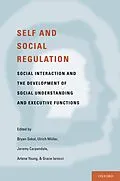New research on children's executive functioning and self-regulation has begun to reveal important connections to their developing social understanding (or "theories of mind") and emotional competence. The exact nature of the relations between these aspects of children's social and emotional development is, however, far from being fully understood. Considerable disagreement has emerged, for instance, over the question of whether executive functioning facilitates social-emotional understanding, or vice versa. Recent studies linking the development of children's social understanding with aspects of their interpersonal relationships also raise concerns about the particular role that social interaction plays in the development of executive function. Three key questions currently drive this debate: Does social interaction play a role in the development of executive function or, more generally, self-regulation? If it does play a role, what forms of social interaction facilitate the development of executive function? Do different patterns of interpersonal experience differentially affect the development of self-regulation and social understanding? In this book, the contributors address these questions and explore other emerging theoretical and empirical links between self-regulation, social interaction, and children's psycho-social competence. It will be a valuable resource for student and professional researchers interested in executive function, emotion, and social development.
Autorentext
Bryan Sokol is an Assistant Professor in the Department of Psychology at St. Louis University. His research interests include the development of children's social understanding and socio-emotional competence, moral agency, and conceptions of selfhood. He is on the board of directors of the Jean Piaget Society. Ulrich Müller is Associate Professor of Developmental Psychology at the University of Victoria. His research focuses on the development of problem solving and social understanding in infants and preschoolers. He is an editor of the Cambridge Companion to Piaget (with Jeremy Carpendale and Les Smith) and associate editor for New Ideas in Psychology. Jeremy I. M. Carpendale is Professor of Developmental Psychology at Simon Fraser University. His areas of research include social cognitive and moral development. He is author with Charlie Lewis of "How Children Develop Social Understanding" (2006, Blackwell), co-editor of several books including the Cambridge Companion to Piaget and associate editor for New Ideas in Psychology. Grace Iarocci is Associate Professor of Psychology and Michael Smith Foundation for Health Research scholar at Simon Fraser University. Her research focuses on the study of attention and cognition and the relation to social development in typical children and in individuals with developmental disorders. She is also interested in the effects of the child's mal/adaptation on parental and family health and well-being. Arlene Young is an Associate Professor of psychology at Simon Fraser University and a clinical child psychologist. Her research interests focus on child individual differences, such as, temperament and cognitive biases and parent-child relationships in the development of anxiety disorders. She also publishes in the area of language and learning disorders including individual difference predictors of long-term outcomes and best practice for intervention.
Inhalt
Preface SECTION 1 Theoretical Perspectives on Self- and Social-Regulation Stuart I. Hammond, Maximilian B. Bibok, and Jeremy I. M. Carpendale Chapter 1 Executive Function: Description and Explanation Anthony Steven Dick and Willis F. Overton Chapter 2 Executive Function: Theoretical Concerns Jack Martin and Laura Failows Chapter 3 Vygotsky, Luria, and the Social Brain Charles Fernyhough Chapter 4 Epistemic Flow and the Social Making of Minds Charlie Lewis, Jeremy Carpendale, John Towse, and Katerina Maridaki-Kassotaki Chapter 5 Developments and Regressions in Rule Use: The Case of Zenadine Zidane Jacob A. Burack, Natalie Russo, Tammy Dawkins, and Mariëtte Huizinga Chapter 6 The Development of Self-Regulation: A Neuropsychological Perspective Marianne Hrabok and Kimberly A. Kerns Chapter 7 Working Memory in Infancy and Early Childhood: What Develops? Maureen Hoskyn SECTION 2 Social Understanding and Self-Regulation: From Perspective-Taking to Theory-of-Mind and Back Bryan W. Sokol, James Allen, Snjezana Huerta, and Ulrich Müller Chapter 8 Object-Based Set-Shifting in Preschoolers: Relations to Theory of Mind Daniela Kloo, Josef Perner, and Thomas Giritzer Chapter 9 Clarifying the Relation between Executive Function and Children's Theories of Mind Louis J. Moses and Deniz Tahiroglu Chapter 10 The Developmental Relations between Perspective Taking and Prosocial Behaviors: A Meta-Analytic Examination of the Task-Specificity Hypothesis Gustavo Carlo, George P. Knight, Meredith McGinley, Rebecca Goodvin, and Scott C. Roesch Chapter 11 The Development of Future Oriented Decision-Making Chris Moore SECTION 3 Self-regulation in Social Contexts: Parents, Peers, and Individual Differences Arlene R. Young, Dagmar Bernstein, and Grace Iarocci Chapter 12 A Bidirectional View of Executive Function and Social Interaction Suzanne Hala, Penny Pexman, Emma Climie, Kristin Rostad and Melanie Glenwright Chapter 13 Underpinning Collaborative Learning Emma Flynn Chapter 14 Psychological Distancing in the Development of Executive Function and Emotion Regulation Gerald F. Giesbrecht, Ulrich Müller, and Michael R. Miller Chapter 15 Emotional Contributions to the Development of Executive Functions in the Family Context Susan M. Perez and Mary Gauvain Chapter 16 Early Social and Cognitive Precursors and Parental Support For Self-Regulation and Executive Function: Relations from Early Childhood into Adolescence Susan H. Landry and Karen E. Smith Chapter 17 Do Early Social Cognition and Executive Function Predict Individual Differences in Preschoolers' Prosocial and Antisocial Behavior? Claire Hughes and Rosie Ensor
